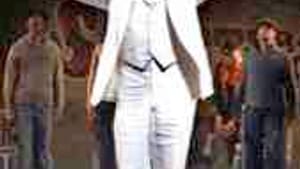Stay in the Loop
BSR publishes on a weekly schedule, with an email newsletter every Wednesday and Thursday morning. There’s no paywall, and subscribing is always free.
A beautiful outrage
"The Scottsboro Boys' on Broadway (2nd review)

This dazzling musical— full of wild singing and dancing, passion and outrage and history— begins with, of all unlikely things, a small, quiet Proustian moment. A silent woman, alone on a chair onstage, modestly dressed, holds a cake box on her lap. She touches it tenderly, then sniffs the cake through the edges of the lid. The aroma triggers an "involuntary memory," and from that, the entire show springs onto stage. What a reveal!
Revealing is what The Scottsboro Boys is all about:
"¢ The ugly racist history of the real Scottsboro Boys "“nine teenagers falsely accused and convicted in 1931 of raping two white women (and convicted repeatedly in appeal after appeal). They became a "cause" for Northern liberals.
"¢ The ugly racist history of minstrel shows, traditionally white men in black face— although here, with breathtaking daring, we watch first black men performing as minstrels, and then, with a final showbiz back-of-the-hand smack, those same black actors, playing black men, put on blackface to go with their white gloves and spats. Their trials became a "media circus," here made literal by a minstrel show (e.g., "I thought you said you had stage experience." "I said I had my leg in a cast.")
"¢ The gorgeousness of watching so much talent onstage, shaped by so much talent offstage: Kander and Ebb (Cabaret, Chicago), who wrote the clever and often beautiful music and the pointed, often beautiful lyrics, and Susan Stroman (winner of five Tony Awards), who directed and created choreography that's both thrillingly vigorous and startlingly satiric.
Surrounded by brutality
The leader of the nine "boys," Haywood Patterson (the spectacular Joshua Henry, looking like a young Sidney Poitier), is never defeated by the injustice and brutality and hypocrisy that surround them. We learn the history of the others— one only a child, one nearly blind— as the cast creates vivid individuals. By the addition of a hat, two of the "boys" (Christian Dante White and James T. Lane) become the Chattanooga prostitutes who accuse them— each with her own personality and history, who can say with outrageous outrage, "I am a Southern white lady."
Every minstrel show, traditionally, needs an Interlocutor: the master of ceremonies who introduces the numbers. The stage veteran John Cullum is the only white man in the show— he also plays the Judge and the Governor of Alabama. In his extraordinary performance, these icons of white power never seem evil or vicious, just entitled and clueless. After 50 years on Broadway, Cullum at 80 can still suggest a cakewalk, can still hold the stage.
For evil and vicious, the show relies on Mr. Bones (Colman Domingo) and Mr. Tambo (Philadelphia's Barrymore winner Forrest McClendon), who play all the power abusers: the Sheriff, his Deputy and the various incompetent Southern Lawyers. In a bold stroke— and a deliciously dangerous caricature— McClendon also plays the Jewish New York lawyer who ventures down South to defend them.
Truth beneath stereotype
To be sure, everyone here is a caricature, with exaggerated smiles and walks and costumes— this concept is fundamental to minstrelsy. But because the show is so layered and the performers so capable, we see the truths beneath the superficial stereotypes.
And it's not just contempt we're invited to feel for these back-in-the-day bigots: The "Electric Chair" number, a tap-dance, exposes our taste for cruelty as entertainment. (When a small boy hawks souvenirs in front of the prison— little wooden dolls hanging from tree branches—his mother calls him to come home: "George! George Wallace! You get back here!")
The Scottsboro Boys offers 17 songs of enormous variety, from the heartbreaking "Southern Days" to the pointed "You Can't Do Me," whose repeated lyric shades from "You can't do me like you done me" to "They can't do us like they done us." The subsequent '50s civil rights pioneer Rosa Parks (Sharon Washington), who maintains her silent witness throughout the show since that opening scene, proved that lyric and the Scottsboro Boys right.♦
To read another review by Steve Cohen, click here.
Revealing is what The Scottsboro Boys is all about:
"¢ The ugly racist history of the real Scottsboro Boys "“nine teenagers falsely accused and convicted in 1931 of raping two white women (and convicted repeatedly in appeal after appeal). They became a "cause" for Northern liberals.
"¢ The ugly racist history of minstrel shows, traditionally white men in black face— although here, with breathtaking daring, we watch first black men performing as minstrels, and then, with a final showbiz back-of-the-hand smack, those same black actors, playing black men, put on blackface to go with their white gloves and spats. Their trials became a "media circus," here made literal by a minstrel show (e.g., "I thought you said you had stage experience." "I said I had my leg in a cast.")
"¢ The gorgeousness of watching so much talent onstage, shaped by so much talent offstage: Kander and Ebb (Cabaret, Chicago), who wrote the clever and often beautiful music and the pointed, often beautiful lyrics, and Susan Stroman (winner of five Tony Awards), who directed and created choreography that's both thrillingly vigorous and startlingly satiric.
Surrounded by brutality
The leader of the nine "boys," Haywood Patterson (the spectacular Joshua Henry, looking like a young Sidney Poitier), is never defeated by the injustice and brutality and hypocrisy that surround them. We learn the history of the others— one only a child, one nearly blind— as the cast creates vivid individuals. By the addition of a hat, two of the "boys" (Christian Dante White and James T. Lane) become the Chattanooga prostitutes who accuse them— each with her own personality and history, who can say with outrageous outrage, "I am a Southern white lady."
Every minstrel show, traditionally, needs an Interlocutor: the master of ceremonies who introduces the numbers. The stage veteran John Cullum is the only white man in the show— he also plays the Judge and the Governor of Alabama. In his extraordinary performance, these icons of white power never seem evil or vicious, just entitled and clueless. After 50 years on Broadway, Cullum at 80 can still suggest a cakewalk, can still hold the stage.
For evil and vicious, the show relies on Mr. Bones (Colman Domingo) and Mr. Tambo (Philadelphia's Barrymore winner Forrest McClendon), who play all the power abusers: the Sheriff, his Deputy and the various incompetent Southern Lawyers. In a bold stroke— and a deliciously dangerous caricature— McClendon also plays the Jewish New York lawyer who ventures down South to defend them.
Truth beneath stereotype
To be sure, everyone here is a caricature, with exaggerated smiles and walks and costumes— this concept is fundamental to minstrelsy. But because the show is so layered and the performers so capable, we see the truths beneath the superficial stereotypes.
And it's not just contempt we're invited to feel for these back-in-the-day bigots: The "Electric Chair" number, a tap-dance, exposes our taste for cruelty as entertainment. (When a small boy hawks souvenirs in front of the prison— little wooden dolls hanging from tree branches—his mother calls him to come home: "George! George Wallace! You get back here!")
The Scottsboro Boys offers 17 songs of enormous variety, from the heartbreaking "Southern Days" to the pointed "You Can't Do Me," whose repeated lyric shades from "You can't do me like you done me" to "They can't do us like they done us." The subsequent '50s civil rights pioneer Rosa Parks (Sharon Washington), who maintains her silent witness throughout the show since that opening scene, proved that lyric and the Scottsboro Boys right.♦
To read another review by Steve Cohen, click here.
What, When, Where
The Scottsboro Boys. Book by David Thompson; music and lyrics by John Kander and Fred Ebb; Susan Stroman directed and choreographed. Closed December 12, 2010 at Lyceum Theater, 149 West 45th St. (between Broadway and Sixth Ave.), New York. (212) 239-6200 or scottsboromusical.com.
Sign up for our newsletter
All of the week's new articles, all in one place. Sign up for the free weekly BSR newsletters, and don't miss a conversation.
 Toby Zinman
Toby Zinman